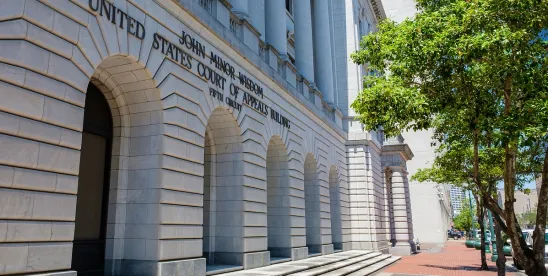- The Fifth Circuit Court of Appeals issued an opinion concluding the No Surprises Act does not give providers a private right of action to enforce and recover from dispute resolution rewards.
- The Court held that unlike the Federal Arbitration Act, the No Surprises Act lacks language authorizing judicial enforcement of IDR decisions, so plaintiffs cannot sue under it.
- The decision comes as federal district courts remain divided on the issue, adding to the ongoing uncertainty surrounding the implementation of the No Surprises Act.
- This decision emphasizes the importance of strategic contract drafting, which may provide independent private causes of action.
In a significant ruling for healthcare providers, the Fifth Circuit Court of Appeals held that two air ambulatory service providers cannot sue to enforce payment of Independent Dispute Resolution (IDR) awards issued under the No Surprises Act. In its June 13 ruling, the Court affirmed the Texas District Court’s previous dismissal, finding that the No Surprises Act does not contain a private right of action allowing providers to enforce such awards directly in federal court.
Background
The No Surprises Act is a U.S. law designed to protect patients from unexpected medical bills. Since coming into effect in January 2022, the law relieves patients from financial liability for so-called “surprise bills”— bills from patients unknowingly receiving care from out-of-network providers, usually in emergency situations or at in-network facilities — and created an IDR-driven framework for billing disputes between providers and insurers.
Under this framework, providers and insurers must first attempt negotiations on the service price. If negotiations fail, either party may initiate the IDR process and select a certified independent resolution entity (CIDRE) to referee further negotiations and determine the amount the insurer owes the provider.
Here, the providers-initiated IDR to resolve their billing dispute with the insurer, and the CIDRE determined the payment award amount the insurer owed the providers. After IDR concluded, the providers sued the insurer, alleging the insurer violated the No Surprise Act by failing to timely pay the IDR award amount to the providers. The providers also alleged causes of action under ERISA and unjust enrichment.
Decision
The Fifth Circuit Court of Appeals reasoned that the providers failed to carry the burden of showing Congress contemplated a private right of action in the No Surprises Act. Instead, Congress intentionally vested the U.S. Department of Health and Human Services (HHS) with the relevant enforcement authority, including the ability to impose administrative penalties on noncompliant insurers that fail to pay providers awarded sums. The panel determined judicial review of IDR awards is limited under the statute to certain provisions of the Federal Arbitration Act (FAA). However, the providers conceded the FAA provisions were inapplicable in this case. The Court rejected the providers’ argument that they were seeking “enforcement” rather than “review” of the awards, calling it a “distinction without a difference,” as judicial review includes actions that seek to confirm or enforce a dispute resolution award.
The Court also dismissed the providers’ ERISA claim for a lack of standing. Although the providers claimed to have been standing through beneficiary assignments, the panel found that the beneficiaries suffered no injury because the No Surprises Act shields them from financial responsibility for out-of-network charges. The unjust enrichment claim failed as well, as the Court found no direct benefit conferred on the insurer. This ruling adds to a growing national divide on No Surprises Act enforcement mechanisms, including for IDR awards.
Key Takeaways
While the Fifth Circuit has now definitively rejected a private right of action under the No Surprises Act, the U.S. District Court for the District of Connecticut recently reached the opposite conclusion, holding that providers can bring suit to enforce IDR awards and assert ERISA claims in that context. That split may ultimately require a resolution by the Supreme Court or further legislative clarification.
Until the circuit split is resolved, providers operating in the Fifth Circuit’s jurisdiction (Louisiana, Mississippi and Texas) must rely on HHS enforcement mechanisms, rather than the courts, to secure payment on IDR awards. This decision underscores the importance of strategic contract drafting and proactive claims management, as providers may have limited legal remedies once the IDR process concludes.





 />i
/>i
